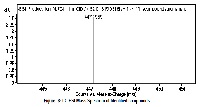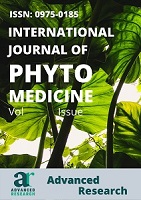Reverse Phase Liquid Chromatography Coupled with Quadra pole- Time of Flight Mass Spectrometry for the Characterisation of Phenolics from Acacia catechu (L.f.) Willd
Keywords:
Acacia, HPLC, LC-ESI-MS.Abstract
A rapid method was developed for the identification of phenolics from Acacia Catechu .The analysis of phenolic compounds was carried out by reversed-phase high-performance liquid chromatography (RPHPLC) coupled to electrospray ionization-time-of-flight mass spectrometry (ESI-Q-TOF-MS). The accurate mass data for the molecular ions were processed using the software Mass Hunter work station (Agilent Technologies), which provided a list of possible elemental formulas by using the Molecular featured extraction editor. The subsequent structure characterization was carried out by a tandem mass spectrometric method. Fragmentation behavior of phenolic compounds was investigated using ion trap mass spectrometry in negative mode. The total fragmentation of the compound ion leading to other fragments was corroborated by MS–MS. Five phenolic compounds have been identified from the methanolic extract of Acacia Catechu.
References
. Liu R, Sun J, Bi K, and Guo D A.
Identification and determination of
major flavonoids in rat serum by
HPLC-UV and HPLC-MS methods
following oral administration of
Dalbergia odorifera extract. J.
Chromatogr. B, 2005; 35-44.
. Zheng W and Wang SY. Antioxidant
activity and phenolic compounds in
selected herbs. J. Agric. Food
Chem, 2001; 49: 5165–70.
. Astley SB. Dietary antioxidants past,
present and future. Trends Food
Sci. Technol, 2003; 14: 93–98.
. Atoui AK, Mansouri A, Boskou G and
Kefalas P. Tea and herbal infusions:
their antioxidant activity and
phenolic profile. Food Chem, 2005;
: 27–36.
. Halliwell B and Gutteridge JMC. Free
Radicals in Biology and Medicine,
2nd ed.; Clarendon Press:
Oxford, UK.
. Charles Mutai, Dennis Abatis,
Constantinos Vagias, Dimitri
Moreau, Christos Roussakis and
Vassilios Roussis. Lupane
Triterpenoids from Acacia mellifera
with Cytotoxic Activity. Molecules,
; 12: 1035-1044.
. Singh BN, Singh BR, Singh RL,
Prakash D, Dhakarey R, Upadhyay
G, Sarma BK and Singh HB.
“Oxidative DNA damage protective
activity, antioxidant and anti-quorum
sensing potentials of Moringa
oleifera”. Food and Chemical
Toxicology, 2009; 47(6): 1109-1116.
. Clement BA, Goff CM, Forbes TDA.
Toxic amines and alkaloids from
Acacia berlandieri”. Phytochemistry,
; 46: 249–254.
. Mujoo K, Haridas V, Hoffmann JJ,
Wa¨chter GA and Hutter L.
Triterpenoid saponins from Acacia
victoriae (Bentham) decrease tumor
cell proliferation and induce
apoptosis. Cancer Research, 2001;
: 5486–5490
. Readel K, Seigler D, Hwang K,
Keesy J and Seilheimer S. Tannins
from Mimosoid legumes of Texas
and Mexico. Economic Botany,
; 55: 212–222.
. Fourie TG, Ferreira D, Roux DG. 8-
O-methyl- and the first 3- O
methylflavan-3,4-diols from Acacia
saxatilis”. Phytochemistry, 1974; 13:
–2587.
. Chopra R.N, Nayar S.L, Chopra I.C.
Glossary of Indian Medicinal Plants,
; NISCOM, CSIR, New Delhi,
India.
. Okpuzar J, Ogbunugafor H, Kareem
G.K and. Igwo-Ezikpe MN. In vitro
investigation of antioxidant
phenolics compounds in extract of
Senne alata, Research journal of
Phytochemistry, 2009; 3(4):68-76.
. Mike S Lee and Edward H Kerns,
LC/MS applications in drug
development, Mass Spectrometry
Reviews, 1999; 18: 188.
. Mullen W, Yokota T, Lean M. E. J
and Crozier A. Analysis of
ellagitannins and conjugates of
ellagic acid and quercetin in
raspberry fruits by LC–MS/MS.
Phytochemistry, 2003;64: 617–624.



